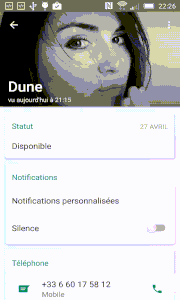Set starting height of CollapsingToolbarLayout
I want to be able to scroll on the ImageView inside the CollapsingToolbarLayout. So how that would be possible, and How to set a starting height of that Image view?
My ImageView height is 280p, at the start of the activity I want to show 200p and then I can scroll down to see the rest of the Image. I have seen something similar in WhatsApp application.
Here is a link to see what I want :
My code :
<?xml version="1.0" encoding="utf-8"?>
<android.support.design.widget.CoordinatorLayout
xmlns:android="http://schemas.android.com/apk/res/android"
xmlns:app="http://schemas.android.com/apk/res-auto"
xmlns:tools="http://schemas.android.com/tools"
android:layout_width="match_parent"
android:layout_height="match_parent"
android:fitsSystemWindows="true"
tools:context="com.example.yasser.version6.Profile">
<android.support.design.widget.AppBarLayout
android:id="@+id/app_bar"
android:fitsSystemWindows="true"
android:layout_height="@dimen/app_bar_height"
android:layout_width="match_parent"
android:theme="@style/MyMaterialTheme.AppBarOverlay">
<android.support.design.widget.CollapsingToolbarLayout
android:id="@+id/toolbar_layout"
android:fitsSystemWindows="true"
android:layout_width="match_parent"
android:layout_height="match_parent"
app:layout_scrollFlags="scroll|exitUntilCollapsed"
app:contentScrim="?attr/colorPrimary">
<ImageView
android:layout_width="match_parent"
android:layout_height="match_parent"
android:scaleType="centerCrop"
android:src="@drawable/tof" />
<android.support.v7.widget.Toolbar
android:id="@+id/toolbar"
android:layout_height="?attr/actionBarSize"
android:layout_width="match_parent"
app:layout_collapseMode="pin"
app:popupTheme="@style/MyMaterialTheme.PopupOverlay" />
</android.support.design.widget.CollapsingToolbarLayout>
</android.support.design.widget.AppBarLayout>
<include
android:id="@+id/content"
layout="@layout/content_profile" />
</android.support.design.widget.CoordinatorLayout>
Content profile code :
<?xml version="1.0" encoding="utf-8"?>
<android.support.v4.widget.NestedScrollView
xmlns:android="http://schemas.android.com/apk/res/android"
xmlns:tools="http://schemas.android.com/tools"
xmlns:app="http://schemas.android.com/apk/res-auto"
app:layout_behavior="@string/appbar_scrolling_view_behavior"
xmlns:card_view="http://schemas.android.com/apk/res-auto"
tools:showIn="@layout/activity_profile"
android:layout_width="match_parent"
android:layout_height="match_parent"
tools:context="com.example.yasser.version6.Profile">
</android.support.v4.widget.NestedScrollView>
Answer
Actually AppBarLayout has special method to apply such offset:
final int setAppBarTopBottomOffset(CoordinatorLayout coordinatorLayout, AppBarLayout appBarLayout, int newOffset, int minOffset, int maxOffset)
Unfortunately it has package-private access level, but we can invoke it through such intermediate chain:
private void setAppBarOffset(int offsetPx){
CoordinatorLayout.LayoutParams params = (CoordinatorLayout.LayoutParams) mAppBarLayout.getLayoutParams();
AppBarLayout.Behavior behavior = (AppBarLayout.Behavior) params.getBehavior();
behavior.onNestedPreScroll(mCoordinatorLayour, mAppBarLayout, null, 0, offsetPx, new int[]{0, 0});
}
One thing to be mentioned - this method should be called after mAppBarLayout is already prepared and measured. So the right way is to call it via view's post method.
mCoordinatorLayour = (CoordinatorLayout) findViewById(R.id.root_coordinator);
mAppBarLayout = (AppBarLayout) findViewById(R.id.app_bar_layout);
mAppBarLayout.post(new Runnable() {
@Override
public void run() {
int heightPx = findViewById(R.id.iv_header).getHeight();
setAppBarOffset(heightPx/2);
}
});

